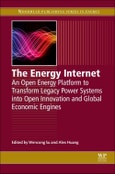The Energy Internet: An Open Energy Platform to Transform Legacy Power Systems into Open Innovation and Global Economic Engines is an innovative concept that changes the way people generate, distribute and consume electrical energy. With the potential to transform the infrastructure of the electric grid, the book challenges existing power systems, presenting innovative and pioneering theories and technologies that will challenge existing norms on generation and consumption. Researchers, academics, engineers, consultants and policymakers will gain a thorough understanding of the Energy Internet that includes a thorough dissemination of case studies from the USA, China, Japan, Germany and the U.K.
The book's editors provide analysis of various enabling technologies and technical solutions, such as control theory, communication, and the social and economic aspects that are central to obtaining a clear appreciation of the potential of this complex infrastructure.
Please Note: This is an On Demand product, delivery may take up to 11 working days after payment has been received.
Table of Contents
1. Centralized, decentralized, and distributed control for Energy Internet 2. Solid state transformers, the Energy Router and the Energy Internet 3. Energy Internet blockchain technology 4. Resilient community microgrids: governance and operational challenges 5. Electricity market reform 6. Medium-voltage DC power distribution technology 7. Transactive energy in future smart homes 8. Emerging data encryption methods applicable to Energy Internet 9. Enabling technologies and technical solutions for the Energy Internet: lessons learned and case studies from Pecan Street Inc. 10. How the Brooklyn microgrid and exergy are paving the way to next-gen energy markets 11. Energy Internet: an open energy platform to transform legacy power systems into open innovation and global economic engine 12. Energy Internet in China 13. Quantum Grid: A packet-based power approach 14. Smart rural grid pilot in Spain 15. Development of European Energy Internet and the role of Energy Union








